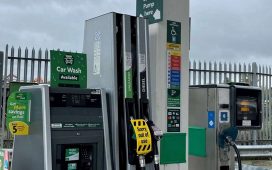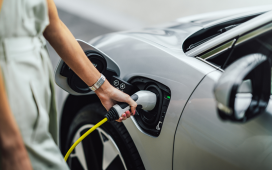What you drive, or are driven in, depends on where in the world you are, and there’s seemingly never been such a profusion of flavors of how to get around than today. Not only are the shapes and sizes diverse — from tiny cars to three-wheelers to mopeds to neo-rickshaws — but you’re as likely to see them powered by electricity as by gasoline. See if you can figure out where these diverse conveyances come from.
1. Tiny unlicensed electric cars have exploded in popularity in this country. Where are these little cars?

- China
- Thailand
- Argentina
- Romania
2. Ever seen an “e-trike”? These versatile vehicles are trending in what country?

- The Philippines
- Papua New Guinea
- Japan
- Mexico
3. Proton and Perodua are the top national brands of what country?

- Brazil
- Egypt
- Colombia
- Malaysia
4. Which Southeast Asian country is one of the biggest markets in the world for compact pickups?

Tata Motors
- Laos
- Cambodia
- Vietnam
- Thailand
5. This sleek scooter is called the Rizta, and it’s made by Ather Energy. Where is it from?

Ather
- Pakistan
- Turkey
- India
- Saudi Arabia
6. Which West African country is home to Spiro, the continent’s biggest manufacturer of two-wheeler EVs?

Damilare Dosunmu/Rest of World
- Nigeria
- Benin
- Senegal
- Ghana
7. This is the Quantum E4. The miniature EV is the first automobile of any kind manufactured in what country?

- Bolivia
- Belize
- Brazil
- Bangladesh
The answers
1. A
China
China has been a leader in global EV production and innovation, but decidedly low-tech, cobbled-together tiny cars have been extremely popular there, as we covered back in 2021. As the article states, “the tiny-car economy started out with over 90% of companies operating like street stalls. They assembled tiny cars when they got orders and worked on scooters when they didn’t. Branding was not a priority, at first, but now larger brands, such as Levdeo, have emerged and are even acquiring regular electric-vehicle companies. Some local governments, like that of the eastern province of Shandong, have even embraced tiny-car companies as new vectors of growth. It’s increasingly clear that, as China tries to wean itself off gas and move toward electric, it is the market, not the state, that will drive this change.”
2. A
The Philippines
The Philippines has recently seen an explosion in three-wheeled EVs, some of which are big enough to transport whole families or modified to carry cargo. Our reporting states that “Manila has among the world’s worst traffic congestion. The long commutes mean more fuel consumption, and higher bills for drivers and commuters … a growing number of Filipinos are hopping onto electric tricycles, commonly known as e-trikes. Most are not registered, and drivers do not have licenses, despite recent efforts to regulate them.”
3. D
Malaysia
Proton and Perodua have long been Malaysia’s main auto manufacturers. We reported: “With their low price points and wide range, the homegrown Proton and Perodua brands have been the first car purchase for Malaysians for decades. They account for nearly two-thirds of car sales in Malaysia, in contrast to other countries in Southeast Asia that have long been dominated by Japanese and Korean brands. As EV sales surge in the region, BYD is dominant, with Vietnam’s VinFast ruling in its home territory. Malaysia, the region’s second-biggest automotive market, is banking on Proton and Perodua to drive EV conversion in the country.”
4. D
Thailand
Thailand is one of the biggest markets in the world for compact pickups. One-ton trucks, used to haul produce, and modified to transport goods and people, make up nearly half of total vehicle sales in the country. Toyota and Isuzu have traditionally ruled sales of trucks there, but recently, Chinese EV makers Great Wall Motor (GWM) and BYD have put pressure on the Japanese firms. The Toyota Hilux has long been the top seller in Thailand (the country is also the leading global manufacturing location for the trucks), and Toyota is trying to preserve this lead with an electric-powered Hilux, the automaker’s first EV pickup truck, which it says it will manufacture in Thailand by the end of 2025.
5. C
India
Ather Energy is based in India, and in its decade in business, the startup has made space for itself in the world’s largest two-wheeler market by focusing on design and innovation. In a country where legacy homegrown players and Chinese brands fight neck and neck, Ather has sold over 226,000 scooters as of June 2024, at which time it held an 11% share of India’s growing e-scooter market.
6. B
Benin
Benin is one of Africa’s youngest countries and certainly not among its largest in area or population, but boasts the largest producer of homegrown electric two-wheelers on the continent, Spiro. Founded in 2019 by Africa Transformation and Industrialization Fund (ATIF), an Abu Dhabi-based investment firm, Spiro has so far placed over 10,000 e-bikes on roads across Benin, Togo, Rwanda, and Kenya. Many of them are part of Spiro’s innovative swap program, which offers new electric two-wheelers in exchange for old motorcycles, without any upfront costs, and provides battery-swapping stations for riders.
7. A
Bolivia
Quantum Motors is Bolivia’s first and only vehicle manufacturer. The company has been heralded as a symbol of Bolivia’s lithium-powered future — but from government red tape to winning over a country that loves big trucks and gas subsidies, the road has not been easy. Bolivia is better known as home to vast lithium deposits, critical to EV battery manufacturing, but this little company that could is a sign of deeper ambitions. The small EV tops out at around 34 miles per hour (50km/h), and has a range of 34-50 miles. It fits one person comfortably and costs around $6,000.







